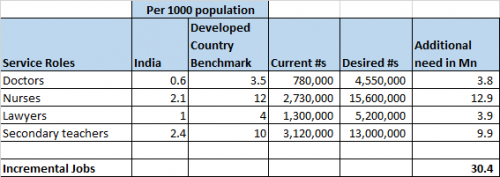It has become clichéd to speak of India as a land of contradictions. Modernity and tradition vie with each other in all spheres of life, in a nation that now the fastest growing large economy in the world, with the youngest demographic.
One of the strange contradictions is the huge pool of human capital available – 1 million job seekers entering the job market every month – yet, an even larger dearth of “Skilled” manpower to address unmet needs.
On the yard stick of the scale of unmet needs, outstrips almost all other developing nations.
Let’s look at Healthcare –
- – With 0.6 doctors, for every 1000 Indian’s– we need 3.7 mn more doctors, to reach the intensity of doctor to population ratio we have the in the US (3.5)
- – India has 2.1 Nursing professionals for every 1000 citizens, whereas the developed country benchmark is 12. Reaching this level of development, means having 12.9 mn more nurses.
- Another sector in crying need for talent is the Education sector, as not only does it impact the quality of talent available to all other sectors –but is itself plagued by poor infrastructure. India has 2.4 Secondary school teacher per 1000 Indians; the developed country benchmark is 10. This means, another 10 million secondary school teaches to reach the standard of development we want.Yet, another sector we cannot ignore, is the Justice system. India has 3 crore pending cases, clogging our Courts. We have 1 Lawyer, for every 1000 Indians; the US has 4 for every 1000 citizens
- These 3 “public service” sectors together have the potential – and the need – to generate upto 30 million new jobs, over the next 10 years – if we want to reach the levels of public service maturity and quality of the developed nations.

- The world’s largest companies are investing money in India – believing that India’s “per capita consumption” reaching global standards, offers a huge growth opportunity
- Similarly, the Government needs to recognize the “Job growth” potential offered by the “per capita” number of skilled professionals, reaching global developed country standards.While this is a simple quantitative analysis, even more needs to be done to enhance the average quality of the talent, in each of these sectors.
The Nation needs “developed country” standards of Healthcare, Education and Justice. Our generation has benefitted tremendously by the economic reforms of the early 90’s and thereafter, which has created and enhanced jobs in the private sector. It has generated a burgeoning middle-class, with aspirations to grow and contribute. We need to provide opportunities to the upcoming generation by investing in the infrastructure and polices, required to create the next 30 million jobs.
- This is not to say that Government is not doing anything:The National Skill Development Mission
The mission has been established to create convergence across sectors and States in terms of skill training activities. Further, to achieve the vision of ‘Skilled India’, the National Skill Development Mission would not only consolidate and coordinate skilling efforts, but also expedite decision making across sectors to achieve skilling at scale with speed and standards. It will be implemented through a streamlined institutional mechanism driven by Ministry of Skill Development and Entrepreneurship (MSDE). Key institutional mechanisms for achieving the objectives of the Mission have been divided into three tiers, which will consist of a Governing Council for policy guidance at apex level, a Steering Committee and a Mission Directorate (along with an Executive Committee) as the executive arm of the Mission. Mission Directorate will be supported by three other institutions: National Skill Development Agency (NSDA), National Skill Development Corporation (NSDC), and Directorate General of Training (DGT) – all of which will have horizontal linkages with Mission Directorate to facilitate smooth functioning of the national institutional mechanism.National Skills Registry (NSR)
NASSCOM aims to promote the interests of the industry by projecting India as the preferred off-shoring destination. Under its ambit of “Trusted Sourcing”, NASSCOM has taken up the Industry initiative of developing a national database of registered and verified workforce for its member companies as “National Skills Registry (NSR)”. NSR seeks to develop a life-time permanent profile for each person working in the industry. Such profiles will be uniquely identified based on bio-metric and will hold credible data about each industry employee including results of background check conducted by a professional third party on the information of such person. NSR is a web-based system hosting a fact sheet of information about existing and prospective employees of Indian IT & ITeS / BPO industry. This can be used by the IT & ITeS / BPO industry and its clients as a credible source of information about the registered professionals. This information resource and industry standard will be extremely useful to the industry, its clients and registered professionals.
